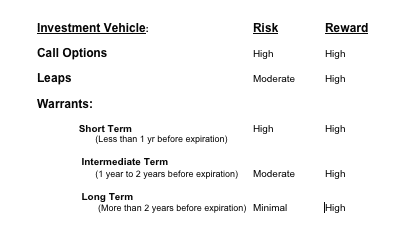Difference between a warrant and a call option
Warrants and call options (options to buy)
Warrants and options share several characteristics but are fundamentally different investment instruments. Options contracts, known as calls and puts, bestow the right, but not the obligation, to buy or sell an underlying stock or other asset at a predetermined strike price on -- and for American-style options, before -- a termination, or expiry, date.
Warrants provide the right to buy an underlying stock from the issuing company at a fixed exercise price until the expiry date.
Differences relate to how these derivatives are issued, traded, exercised and priced. Warrants are commonly issued by corporations and are either attached to other instruments, such as preferred shares or bonds, or are unattached, or "naked.
Options are written by traders and financial institutions on an options exchange; premiums are not collected by an issuing corporation. Corporations raise capital by issuing stock warrants but have no stake in stock options.
Because corporations create new stock shares when warrants are exercised, stock warrants dilute the earnings per share of the issuing corporation, whereas options have no such effect.

Options are highly standardized exchange-traded products that have well-defined strike prices and expiry dates. Warrants are over-the-counter products, meaning they can be highly customized by the issuer. Option expiration dates can range from one month to three years. Warrants have much longer lifetimes, sometimes up to 15 years. An equity option represents shares of underlying stock, but difference between a warrant and a call option conversion ratio for a warrant is set by the issuing corporation and can be convertible into a fractional number of shares.
The current price of an option or warrant is composed of time value based on the time until expiration and intrinsic value the difference between the strike price and the current price of the underlying stock.
However, corporations always issue warrants with strike prices above current stock prices.

Option writers can choose from a standard set of strike prices, including strikes below the current stock price. Option buyers thus have many premium choices depending on strike price; warrant buyers have no such flexibility. Options can be sold long or short, but corporate-issued warrants are long only; corporations cannot issue short warrants.
This difference and the flexible premium choices on options make them more suitable to certain trading strategies such as credit spreads, where options are simultaneously purchased and shorted, allowing the writer to collect the binary options better earnings premium.
Warrants And Call Options | Investopedia
In addition, corporate-issued warrants provide no downside price protection for hedging against a declining underlying stock, but because options can be shorted, they are useful in this regard. Warrants and options, while similar, have several important differences. Issuance Warrants are commonly issued by corporations and are either attached to other instruments, such as preferred shares or bonds, or are unattached, or "naked.
Structure Options are highly standardized exchange-traded products that have well-defined strike prices and expiry dates. Pricing The current price of an option or warrant is composed of time value based on the time until expiration and intrinsic value the difference between the strike price and the current price of the underlying stock. Trading Strategies Options can be sold long or short, but corporate-issued warrants are long only; corporations cannot issue short warrants.
References Istanbul Stock Exchange: Comparison -- Options vs. How to Trade With Options. Resources "Share Investing For Dummies Kindle Edition ": James Dunn "Derivatives Demystified: A Step-by-Step Guide to Forwards, Futures, Swaps and Options": Stock Options Cheat Sheet Derivatives Vs.
Options How to Trade Leveraged Stock Options Risky Option Strategies What Is the Longest Term Stock Put You Can Buy? The Variables That Drive a Stock Option's Value. Stock Options Explained in Plain English Rules for Buying Stock Options Conservative Option Strategies How to Trade Options Weekly. More Articles You'll Love.
Risk Factors Affecting Option Price. What Is Fixed Income Derivatives? Stock Options Explained in Plain English. Rules for Buying Stock Options. How to Trade Options Weekly. Stock Options Cheat Sheet. How to Trade Leveraged Stock Options. What Is the Longest Term Stock Put You Can Buy? About Us Careers Investors Media Advertise with Us Check out our sister sites. Privacy Policy Terms of Use Contact Us The Knot The Bump.